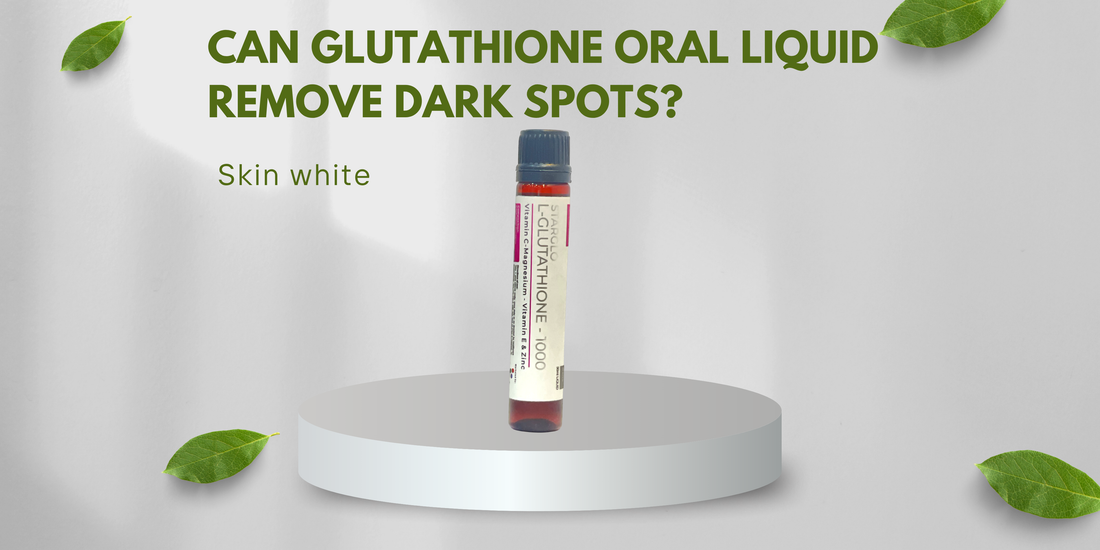
Can glutathione oral liquid remove dark spots?
Share
The journey to clear, bright skin often feels endless. Many ingredients claim to help, and glutathione stands out among them. This powerful antioxidant is often found in oral supplements, including liquid forms. People often link it to fewer dark spots and brighter skin. But do these claims hold up, especially when we talk about liquid glutathione you drink?
This article digs deep into whether oral glutathione liquid truly helps with dark spots. We will look at how it works, what research says, and what you should think about. Skin concerns like sun damage, melasma, and dark marks from acne are common. Many people want real answers. Oral glutathione liquid seems like an easy way to get this strong antioxidant. Still, it is important to know if it really fades those stubborn dark spots. Let us explore the facts, possible side effects, and how it fits into getting an even skin tone.
The Antioxidant Powerhouse
This powerful compound works hard to fight off free radicals. Free radicals are unstable molecules that can harm your cells. This damage is called oxidative stress. Oxidative stress can speed up skin aging. It also plays a role in making dark spots. Glutathione helps keep your skin looking younger and healthier by fighting this stress.
Glutathione's Mechanism for Skin Brightening
Glutathione may help lighten your skin tone in a few ways. It might slow down tyrosinase, an enzyme that makes melanin. Melanin is the pigment that gives skin its color. Less tyrosinase activity could mean less melanin production. Also, glutathione might shift how your body makes melanin. It may encourage the creation of lighter pheomelanin instead of darker eumelanin. This could lead to a brighter skin tone.
How Oral Glutathione Liquid Works (or Doesn't) for Dark Spots
Oral glutathione liquid sounds simple. You drink it, and it helps your skin. But how well does your body use it? This part looks at how drinking glutathione might affect dark spots.
Bioavailability of Oral Glutathione
A big challenge with oral glutathione is how well your body absorbs it. Your digestive system can break down glutathione before it gets into your bloodstream. This makes it hard for enough of it to reach your cells. Some studies suggest that absorption can be low. Different forms and liposomal formulations aim to improve this. Still, getting enough active glutathione from a liquid you drink remains a hurdle for many.
Glutathione's Impact on Melanin Production
Does drinking glutathione directly lead to less melanin and lighter dark spots? Research on this is still growing. Some studies show a link between oral glutathione and lighter skin. They suggest it can reduce melanin. However, larger, high-quality studies are needed to confirm these effects. It is not always clear if the amount absorbed is enough to make a big difference in hyperpigmentation for everyone.
Factors Affecting Efficacy
Many things can change how well oral glutathione liquid works for you. The dose you take matters. The quality of the product also plays a role. Look for pure ingredients. Your own body's way of handling the supplement is important too. Some people might respond differently from others. Also, if the liquid includes other skin-friendly ingredients, it could boost its effects.
Scientific Evidence: Does Oral Glutathione Liquid Actually Fade Dark Spots?
It's exciting to hear about a product that can fade dark spots. But what does the science say about oral glutathione liquid? Let's look at the studies.
Clinical Studies on Oral Glutathione
Several clinical trials have looked at oral glutathione for skin lightening. Some studies show promising results, with participants reporting lighter skin. They often use specific forms of glutathione. These studies vary in size and how they are set up. Many are small or only last a short time. This means we need more large, long-term studies to be sure about its effects. We need more proof that oral glutathione consistently fades dark spots for everyone.
Research on Glutathione for Hyperpigmentation Conditions
Some research explores glutathione's role in specific dark spot issues. This includes conditions like melasma or dark marks after acne, known as post-inflammatory hyperpigmentation. Again, while some findings are positive, strong evidence for oral forms is still building. It is important to remember that these conditions can be stubborn. They often need a mix of treatments.
Alternatives and Complementary Approaches for Dark Spot Removal
Oral glutathione liquid might be one option. But many other methods can treat dark spots effectively. Some of these are well-researched and widely used.
Topical Treatments for Hyperpigmentation
You can find many effective creams and serums for dark spots. Vitamin C is a powerful antioxidant that brightens skin. Niacinamide helps reduce redness and improve skin tone. Retinoids, like retinol, speed up cell turnover. Hydroquinone is a strong skin lightener, but use it carefully and under a doctor's guidance. Alpha hydroxy acids (AHAs) gently exfoliate. Kojic acid also helps lighten dark spots.
Professional Dermatological Procedures
For stubborn dark spots, a skin doctor can offer in-office treatments. Chemical peels use acids to remove the outer skin layers. Laser therapy targets melanin to break it down. Microneedling creates tiny punctures to help skin heal and renew itself. These procedures often give faster and more noticeable results.
Lifestyle and Prevention Strategies
The best way to manage dark spots is to prevent them. Sun protection is key. Use broad-spectrum sunscreen with SPF 30 or higher every day. Wear hats and seek shade. Sun exposure makes dark spots worse. A healthy diet and managing stress also support overall skin health. These simple steps can make a big difference.
Oral Glutathione for Dark Spots – At a Glance
| Factor | Details |
|---|---|
| Purpose | Skin brightening, dark spot fading |
| Form | Oral liquid supplement |
| Effectiveness | Mild – varies by person |
| Timeframe | 4–12 weeks for visible results |
| Safety | Generally safe; minor side effects |
| Best Paired With | Sunscreen, Vitamin C, healthy diet |
What to Consider Before Taking Oral Glutathione Liquid
Thinking about taking oral glutathione liquid for dark spots? Here are some important things to keep in mind before you start.
Choosing a Quality Product
Not all supplements are equal. Look for oral glutathione liquid products from trusted brands. Check for third-party testing. This means an outside group has checked the product for purity and what it claims to contain. Read the ingredient list carefully. See what type of glutathione it uses. Liposomal forms often claim better absorption.
Potential Side Effects and Interactions
Glutathione is generally safe for most people. However, some might experience mild side effects. These can include stomach cramps, bloating, or skin rashes. If you have asthma, be extra careful. Glutathione could worsen symptoms for some people with asthma. Always check with your doctor if you take other medicines. There might be unknown interactions.
Realistic Expectations and Timeframes
It is important to have clear expectations. Dark spots do not disappear overnight. Any changes from oral glutathione could take weeks or even months to show up. Results also vary greatly from person to person. Do not expect a quick fix. Think of it as a long-term addition, if at all.
Consulting a Healthcare Professional
Before you start any new supplement, talk to your doctor. This is very important, especially if you have existing health issues. A dermatologist can help you understand your dark spots. They can also suggest the best and safest treatment plan for your skin. They can tell you if oral glutathione liquid makes sense for you.
Conclusion: Is Oral Glutathione Liquid the Answer for Your Dark Spots?
The desire for even, clear skin is strong. Oral glutathione liquid has gained attention for its potential to lighten dark spots. But is it the best solution?
Key Takeaways on Oral Glutathione for Dark Spots
Oral glutathione works as a strong antioxidant. It may also play a role in how your body makes melanin. Some studies suggest it can help lighten skin. However, the biggest challenge is getting enough of it into your system. Many forms struggle with good absorption. More research is needed to fully confirm its power against dark spots. We need larger, longer studies to be certain.
Prioritizing Proven Skincare Practices
When it comes to fading dark spots, many proven methods exist. Topical treatments with ingredients like Vitamin C, niacinamide, and retinoids are effective. Professional treatments such as chemical peels and lasers offer faster results. Most importantly, sun protection is the ultimate defense. Wearing sunscreen daily prevents new dark spots and keeps old ones from getting darker. These methods are well-researched and widely trusted.
Making Informed Decisions
Oral glutathione liquid might offer some benefits. But it should be part of a bigger plan for skin health. Weigh the scientific evidence. Think about its potential alongside other, more established treatments. Always talk to a doctor or dermatologist. They can help you make the best choice for your skin and your health. Your skin deserves a thoughtful, informed approach.
FAQs: Oral Glutathione Liquid for Dark Spots
1. Does oral glutathione liquid really fade dark spots?
Some studies suggest mild improvement, but results vary and more research is needed.
2. How long does it take to see results?
It may take several weeks to months; results depend on dosage, absorption, and skin condition.
3. Is oral glutathione safe to use?
Generally safe, but may cause mild side effects like bloating or rashes in some people.
4. Can everyone use glutathione supplements?
Most people can, but those with asthma or on medications should consult a doctor first.
5. Which form of glutathione is best absorbed?
Liposomal glutathione may offer better absorption than standard liquid or capsule forms.
6. Are there better treatments for dark spots?
Yes—topicals like Vitamin C, niacinamide, retinoids, and procedures like peels or lasers are proven.
7. Should I stop using sunscreen if I take glutathione?
No, sunscreen is essential; it prevents new dark spots and enhances overall treatment results.
8. Can I take glutathione with other skin supplements?
Possibly, but always check with a healthcare provider to avoid interactions or overuse

